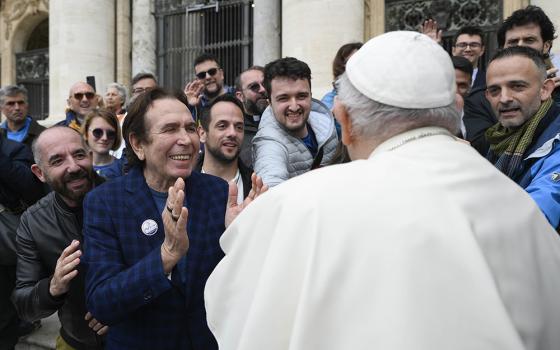For those who came looking for battle cries, the USCCB meeting has been a disappointment. True, Bishop William Lori, head of the new ad hoc committee on religious liberty gave a rousing speech on the subject, but USCCB President Archbishop Timothy Dolan did not mention the issue, still less issue a summons to war, in his inaugural presidential address. Indeed, at a press conference yesterday, when asked about his meeting with President Obama, Archbishop Dolan said that “I found the president of the United States to be very open to the sensitivities of the Catholic community. I left there feeling a bit more at peace about this issue than when I entered.”
There are some bishops who would like a “war” with this White House. These are the same bishops who used some highly charged words about President Obama, who repeat GOP talking points about Obama being the most pro-choice president in history, and who slammed the University of Notre Dame for inviting him to give the 2009 commencement address. But, in speaking to bishops at lunch and over coffee breaks, you get the clear impression that most of them do not want a war on issues like conscience protection, they just want to win. And, while the issue of gay marriage has the bishops on a collision course with Democrats at both the state and federal level over the issue of religious liberty and conscience exemptions, it is clear that many also worry that anti-immigration policy will be another avenue where the conscience rights of the Church must be protected, and that issue pits the bishops against the GOP, not the Democrats, at both the state and federal level.
The ball is in the administration’s court on all this. If the Department of Health and Human Services provides a broader conscience exemption, one that includes both the employees of Catholic institutions and students at Catholic colleges, a lot of the worries the bishops harbor will be deflated. If HHS sticks with the narrow exemption in the interim rule mandating contraception coverage in all health care policies, there could be a war, a prospect that Michael Gerson notes in his column this morning is “politically incomprehensible.” The President needs to get control over his own administration, including HHS.
But, the most revealing part of the yesterday’s proceedings, to my mind, came in twin talks by Archbishop Dolan. In the morning, his presidential address was quite forthright about the need for the Church to re-establish her credibility by showing the face of Christ in all that the Church does. In the afternoon, Dolan spoke briefly at the Catholic Campaign for Human Development reception. CCHD had just given its annual Cardinal Bernardin Award to Rosibel “Rosie” Mancillas Lopez, a law student at the University of San Diego who became involved in a CCHD-funded group that helps immigrant communities. Mancillas Lopez fought back tears as she told her story of coming to this country without documents as a child, her love for the Church, and how her faith compelled her to speak out on behalf of immigrants and their rights. Archbishop Dolan said that Mancillas Lopez’s work was a perfect example of how the Church can re-establish its credibility and praised her for her service.
When Archbishop Dolan was appointed to New York, I noted that he had written his doctoral dissertation of the late Archbishop Edwin O’Hara, a pre-Vatican II bishop known as a reformer. O’Hara perceived the need to focus on the basics of the faith and was a prime mover in creating the Confraternity for Christian Doctrine and the Catholic Biblical Association. Dolan’s morning address and his comments at the CCHD reception were both, in their different ways, a call for the Church to focus on its core mission of evangelization and Christian witness. In his morning speech, Dolan quoted Henri deLubac, Dorothy Day and John Tracy Ellis, who are probably my three favorite 20th century Catholics, so I admit my bias. But, the point is this: Dolan understands that the Church’s struggle in the culture war issues of same sex marriage, contraception and immigration must all be tethered to the mast of fidelity to the Gospel. We evangelize and therefore we go out into the world to engage in the issues of the day, not the other way round.
A wise man once gave me his take on Archbishop Dolan. He said he discerned three key features of Dolan’s personality. One side just got off the phone with a Catholic neo-con like Robbie George and is susceptible to those arguments. Another wise believes evangelization is best undertaken at a backyard BBQ. And the third side is the student of John Tracy Ellis, someone who can take the long view of events and separate the core, animating concerns from the often unhelpful and even distorting rush of events which can actually obscure, rather than enlighten, those core concerns. We are beginning to see this third side of Dolan’s personality shine through and it augurs well for a profound tenure at the helm of the USCCB.




